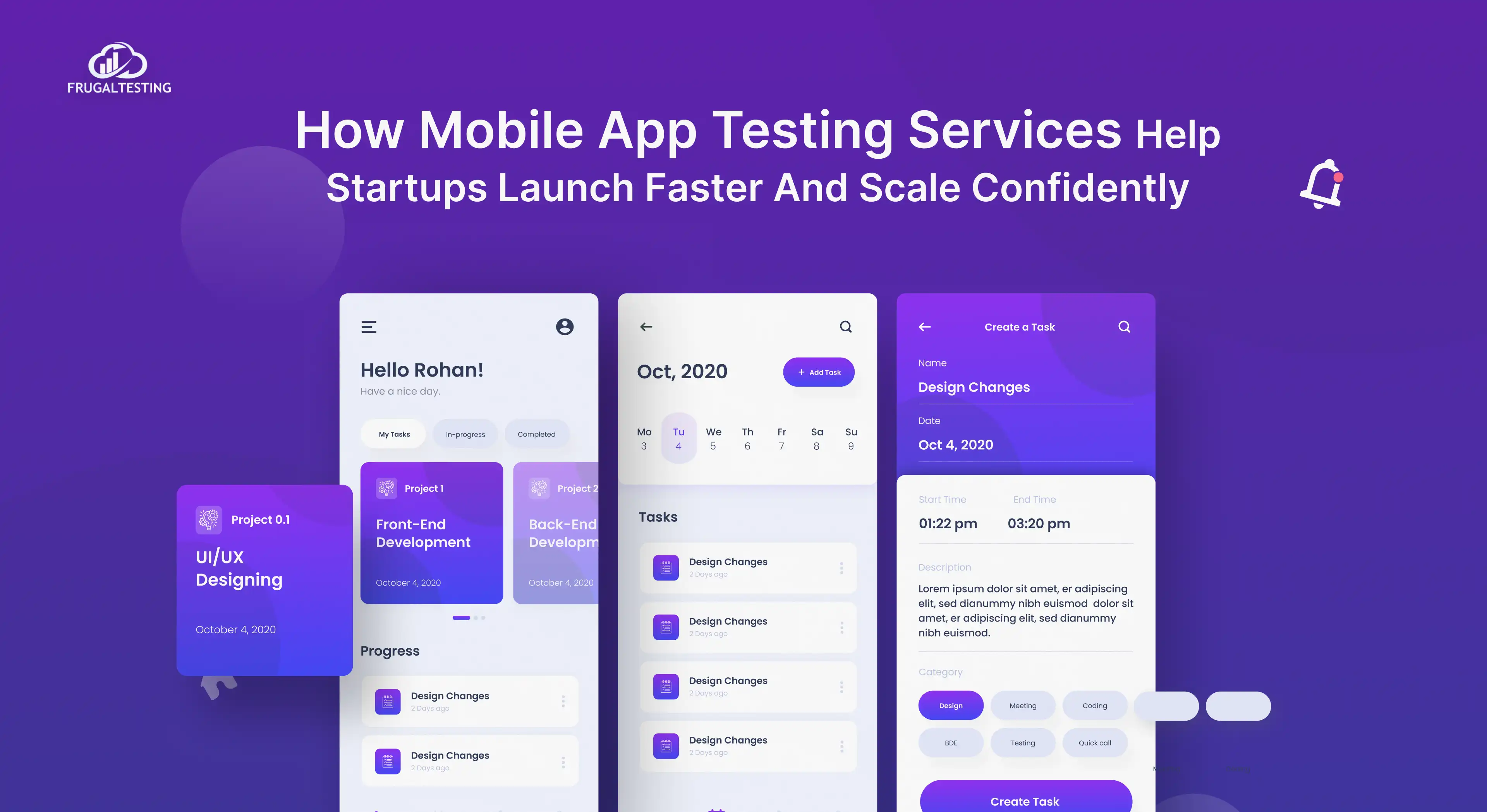Cloud-based testing has revolutionized software development by offering scalable, flexible, and efficient quality assurance (QA) solutions. With the rise of cloud computing infrastructure, organizations can now leverage cloud-based testing platforms to execute various types of testing, such as manual testing, integration testing, stress testing, and automation testing. These platforms allow teams to run tests on a wide range of environments and devices without requiring extensive on-premise infrastructure. Cloud-based software testing, powered by infrastructure for cloud computing, ensures that applications meet performance and functionality standards across multiple devices and networks.
Additionally, cloud migration testing approaches enable businesses to test their applications’ readiness for seamless migration to cloud environments. From cloud performance testing tools to cloud load testing and automated testing, these services streamline the process while maintaining high-quality standards. With private cloud infrastructure and cloud automation testing tools, teams can optimize their testing workflows and boost overall efficiency.
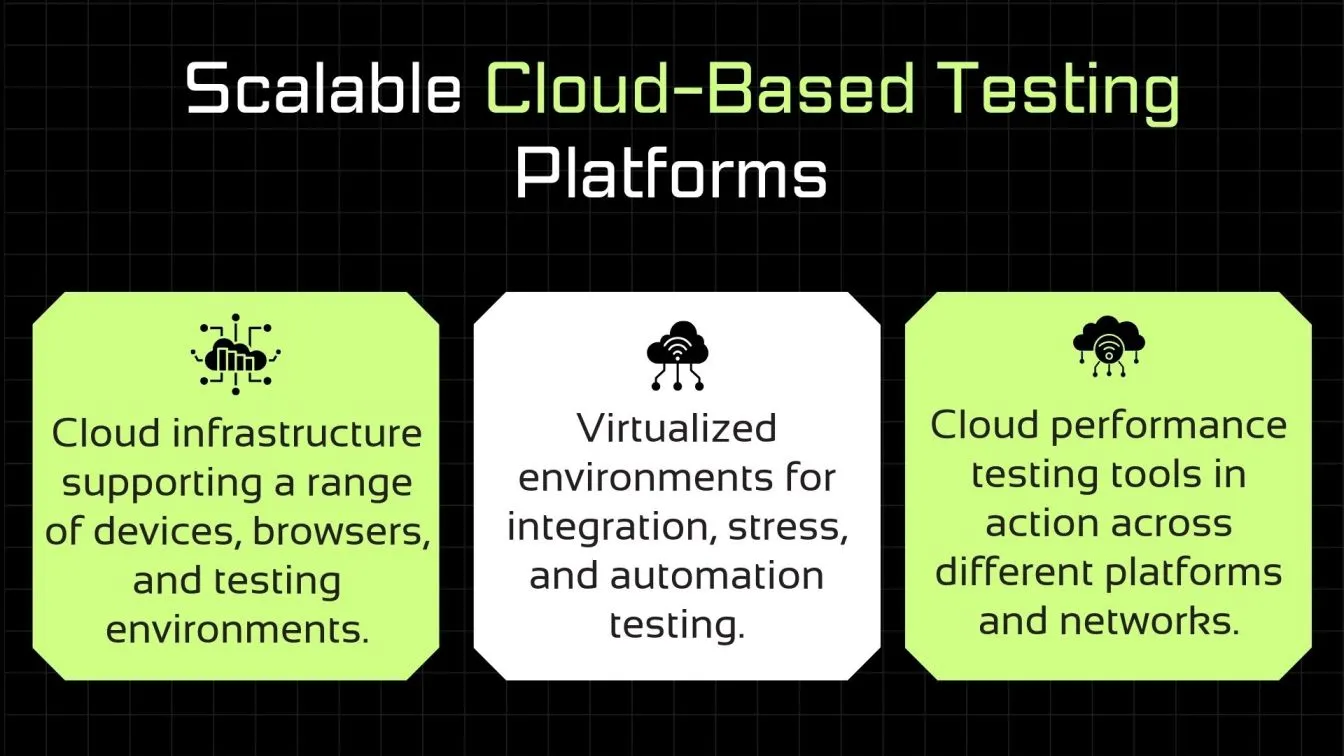
Key takeaways 🚀
- Scalability & Flexibility: On-demand scaling across devices, browsers, and environments.
- Cost Efficiency: Pay-as-you-go model reduces hardware and maintenance costs.
- Faster CI/CD Integration: Seamless automation for quicker releases and continuous testing.
- Security & Compliance: Data encryption, access controls, and adherence to regulations (e.g., GDPR, HIPAA).
Why Cloud-Based Testing is the Future of QA
Cloud-based testing is providing dynamic, cost-efficient, and scalable solutions for modern software development needs. With the rapid adoption of cloud computing, organizations can now move beyond traditional testing infrastructures to more flexible and automated testing environments.
What are Cloud-Based Testing Platforms?
Cloud-based testing platforms enable businesses to run quality assurance tests on virtual environments hosted in the cloud, eliminating the need for on-premise infrastructure. These platforms offer:
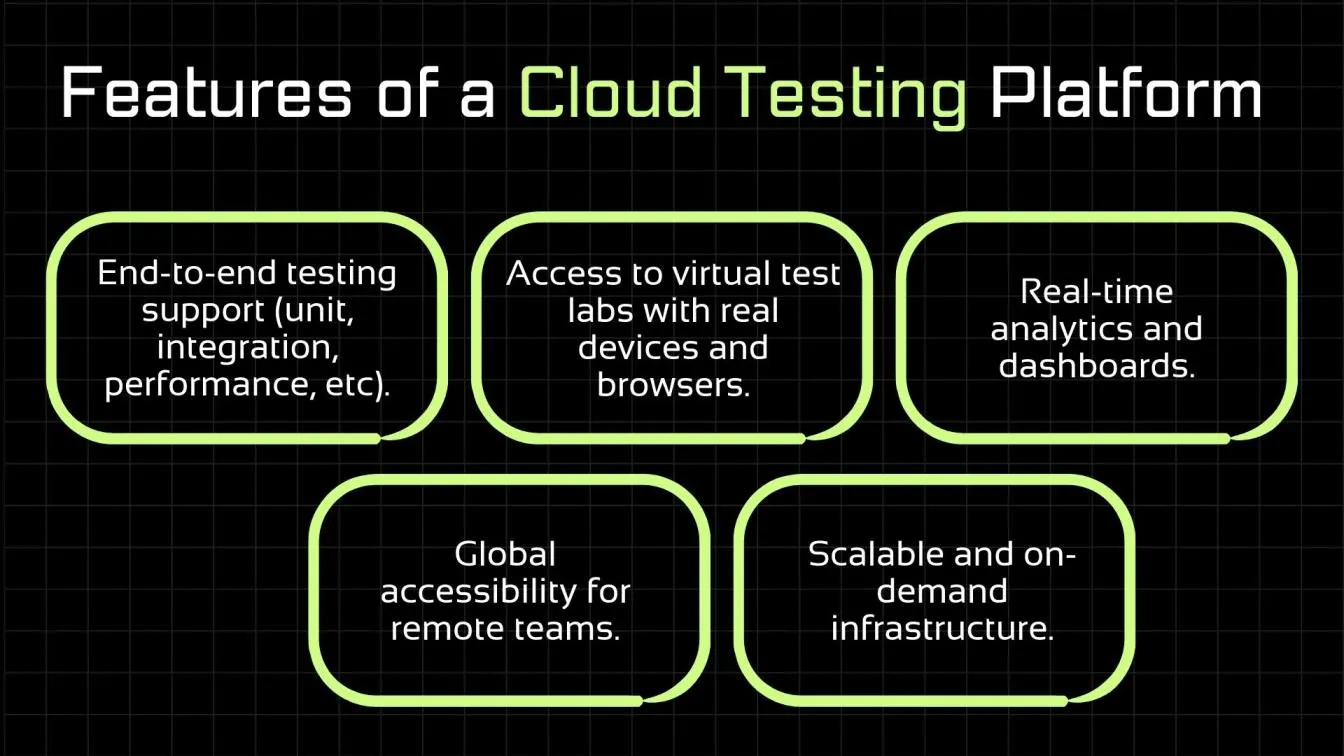
- On-Demand Resource Allocation: Instantly scale test environments based on project needs.
- Cost Efficiency: Pay only for the resources you use, avoiding significant upfront investments.
- Automated Testing Tools: Access tools for automation testing, integration testing, and cloud performance testing.
- Device & Browser Diversity: Test across a wide range of devices, browsers, and OS versions without additional hardware costs.
Why Traditional QA Falls Short in Scalability?
Traditional QA methodologies, including manual testing and stress testing, often struggle to scale effectively. This results in several challenges:
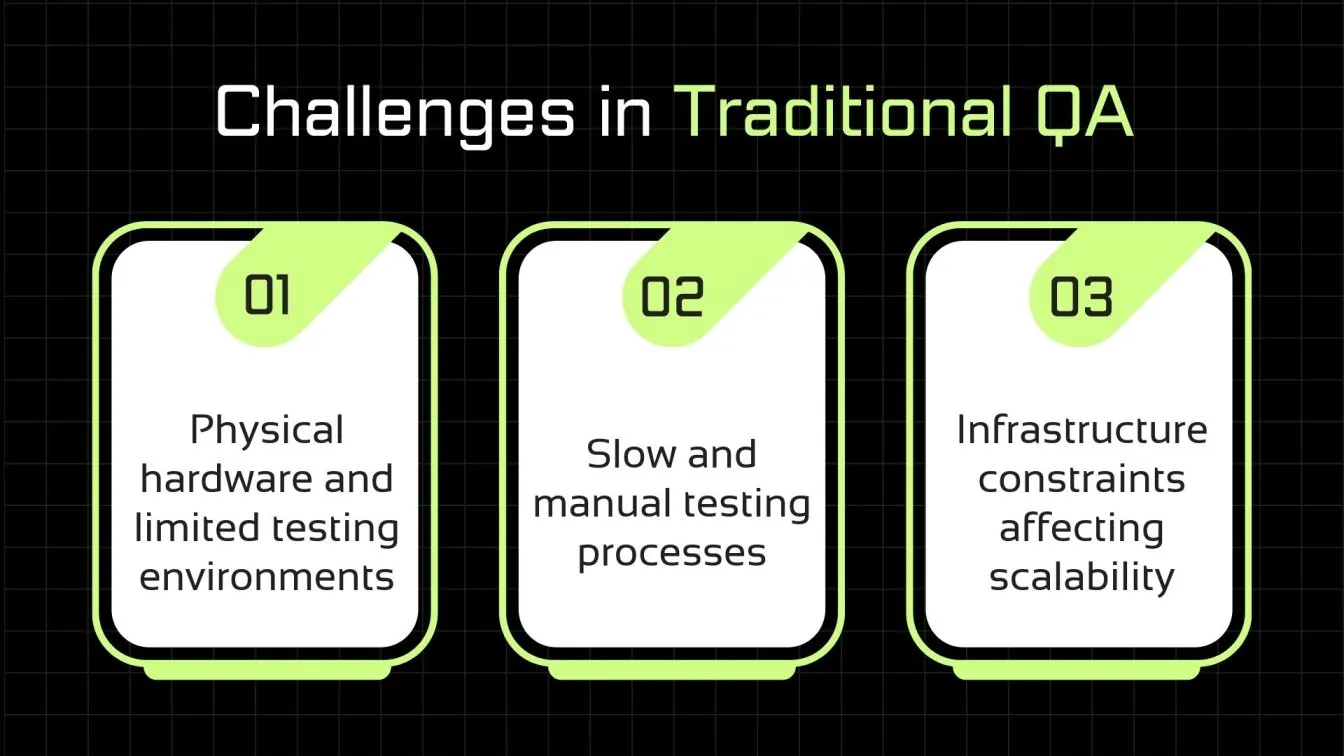
- Limited Testing Environments: Traditional setups are confined to physical infrastructure, making it difficult to test on multiple platforms simultaneously.
- Slow Feedback Loops: Manual and on-premise tests can be time-consuming, delaying the development process.
- High Infrastructure Costs: Expanding infrastructure for testing requires significant investment in hardware and maintenance.
- Difficulty in Handling Large Traffic: Scaling for peak load or stress testing is more challenging with traditional QA setups.
Cloud-based solutions address these issues by offering high scalability, faster test execution, and access to various types of testing services.
Benefits of Cloud-Based Testing Platforms
Cloud-based testing platforms offer significant advantages to software development teams, helping them streamline their testing processes and achieve better quality assurance (QA). By leveraging cloud computing, businesses can access a variety of testing tools and environments without the need for expensive physical infrastructure.
Cost Efficiency in Cloud Testing Platforms
One of the primary benefits of cloud-based testing platforms is their cost efficiency. With cloud platforms, organisations can dramatically reduce the overhead associated with traditional testing environments. Here's how:
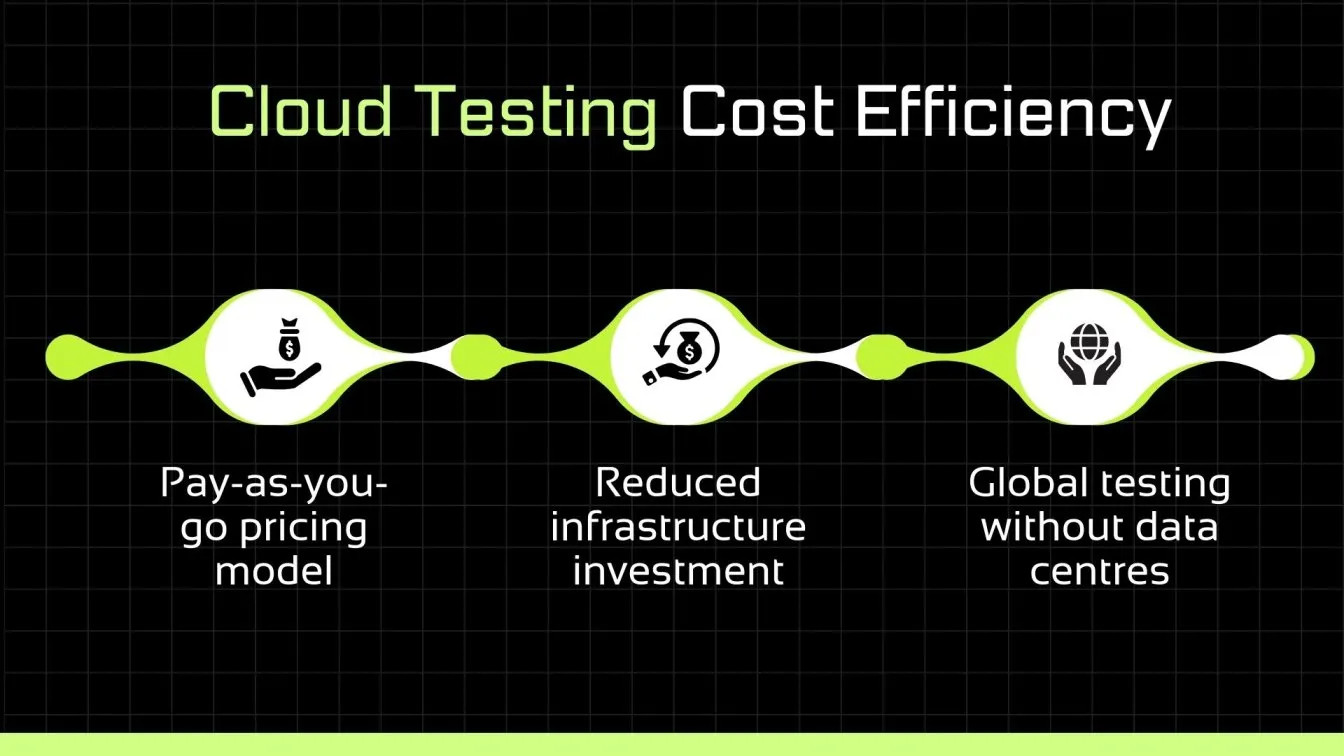
- Pay-As-You-Go Model: Only pay for the resources used during testing, avoiding hefty upfront hardware investments.
- No Infrastructure Maintenance: Cloud providers handle infrastructure maintenance, lowering long-term operational costs.
- Scalable Resources: Increase or decrease resources based on testing needs, reducing unnecessary expenditures with robust security measures.
- Global Testing Access: Test on multiple geographies and environments without setting up costly data centres.
Cloud testing not only makes testing more efficient but also accelerates the time to market by allowing faster and more cost-effective quality assurance across various platforms.
Key Features to Look for in a Cloud QA Platform
When choosing a cloud-based testing platform, it's crucial to evaluate its ability to integrate with your existing CI/CD pipelines. This integration can significantly improve the speed, efficiency, and quality of your software development and testing efforts. A well-integrated cloud QA platform ensures a seamless testing experience, delivering continuous testing and better results throughout the development lifecycle.
Integration with CI/CD Pipelines
Cloud-based testing tools that integrate with continuous integration (CI) and continuous testing (CT) frameworks offer numerous advantages to development teams. Here’s why it’s essential for modern QA practices:
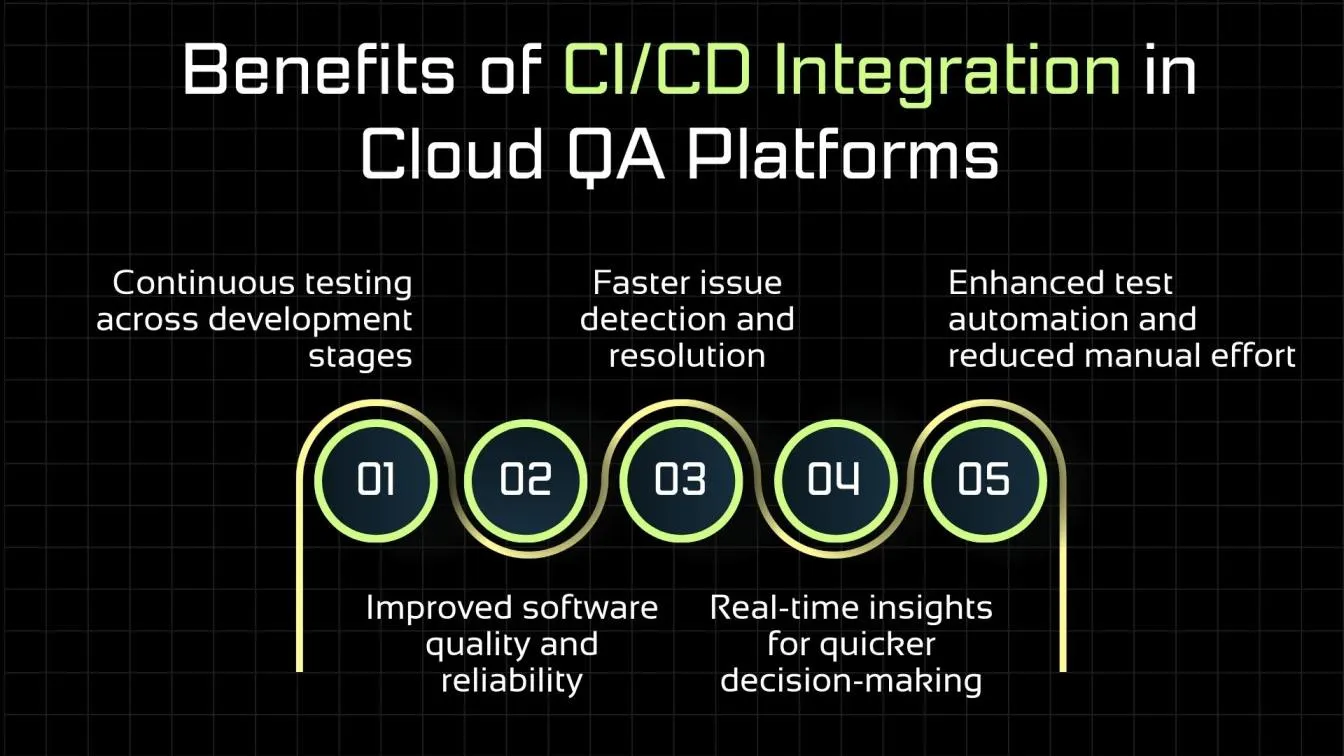
- Seamless Integration: The ability to seamlessly integrate with CI/CD pipeline is a key advantage. It allows testing teams to automate test cases within their existing workflows, enabling quicker feedback loops.
- Continuous Testing: With CI/CD integration, testing can occur continuously throughout the development process, ensuring real-time results and reducing bottlenecks. This significantly improves testing efforts, as testing is not a one-time task but an ongoing process.
- Faster Testing Cycles: Continuous testing helps reduce the time it takes to detect issues, leading to faster testing cycles. The ability to run automated tests frequently in real-world conditions accelerates feedback and improves test coverage across all stages of development.
- Improved Testing Efficiency: By automating repetitive tasks and reducing manual intervention, testing teams can focus on higher-priority issues. This not only enhances testing efficiency but also improves the overall quality of the product.
- Resource Utilization & Cost Savings: Cloud QA platforms optimize resource usage, ensuring efficient resource utilization. With fewer resources required for manual testing, companies can reduce costs and increase testing throughput.
The key benefits of cloud-based testing tools are clear. With their ability to continuously test in parallel with development, teams can detect issues earlier and address them promptly. This results in reduced costs, resource utilization, and more efficient testing efforts.
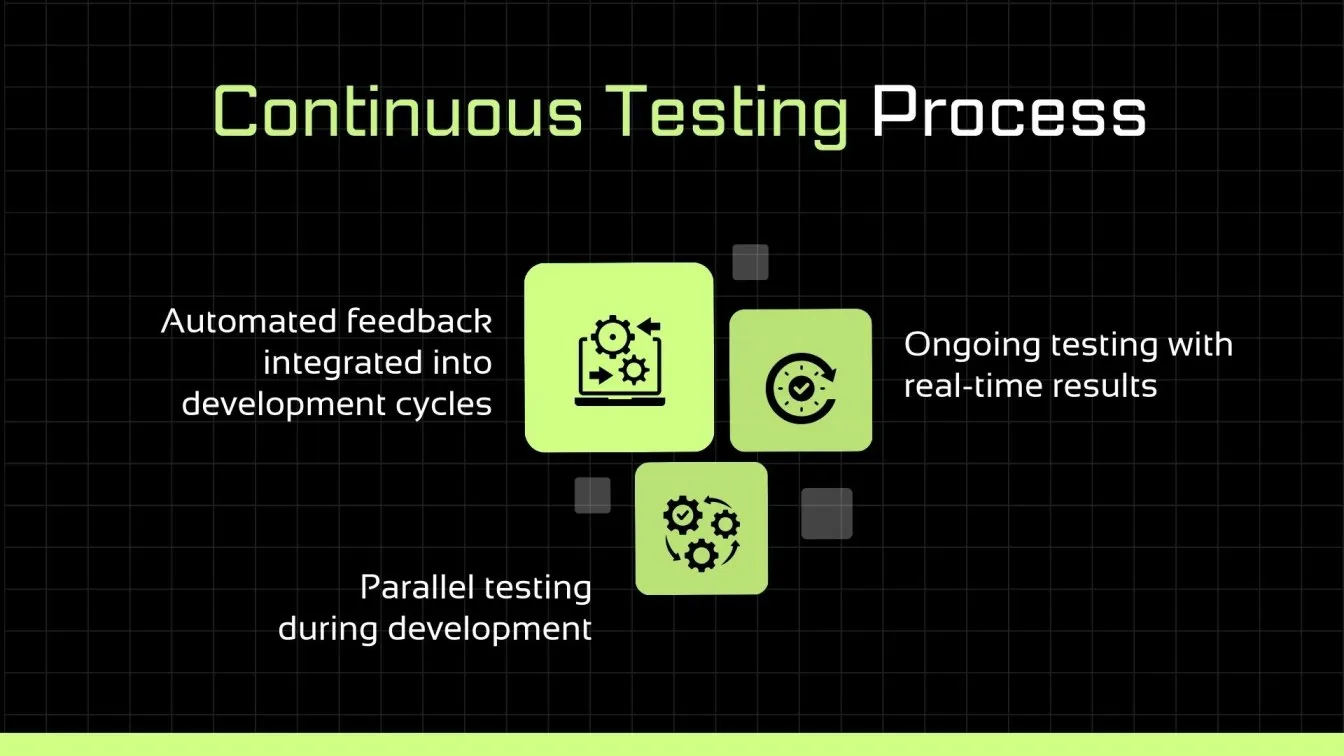
By adopting cloud testing tools that work in tandem with CI/CD pipelines, companies can achieve shorter development cycles, optimize testing efficiency, and gain significant cost savings.
The ability to test in real-world conditions through the cloud gives teams the flexibility to simulate various environments, making sure the application performs optimally across all platforms, browsers, and devices.
How Cloud-Based Testing Scales with Your QA Needs
Cloud-based testing platforms are incredibly versatile, allowing organizations to scale their QA efforts as their testing needs evolve. With the ability to run tests across a variety of environments, cloud platforms eliminate the need for costly infrastructure and provide the flexibility that modern development teams require.
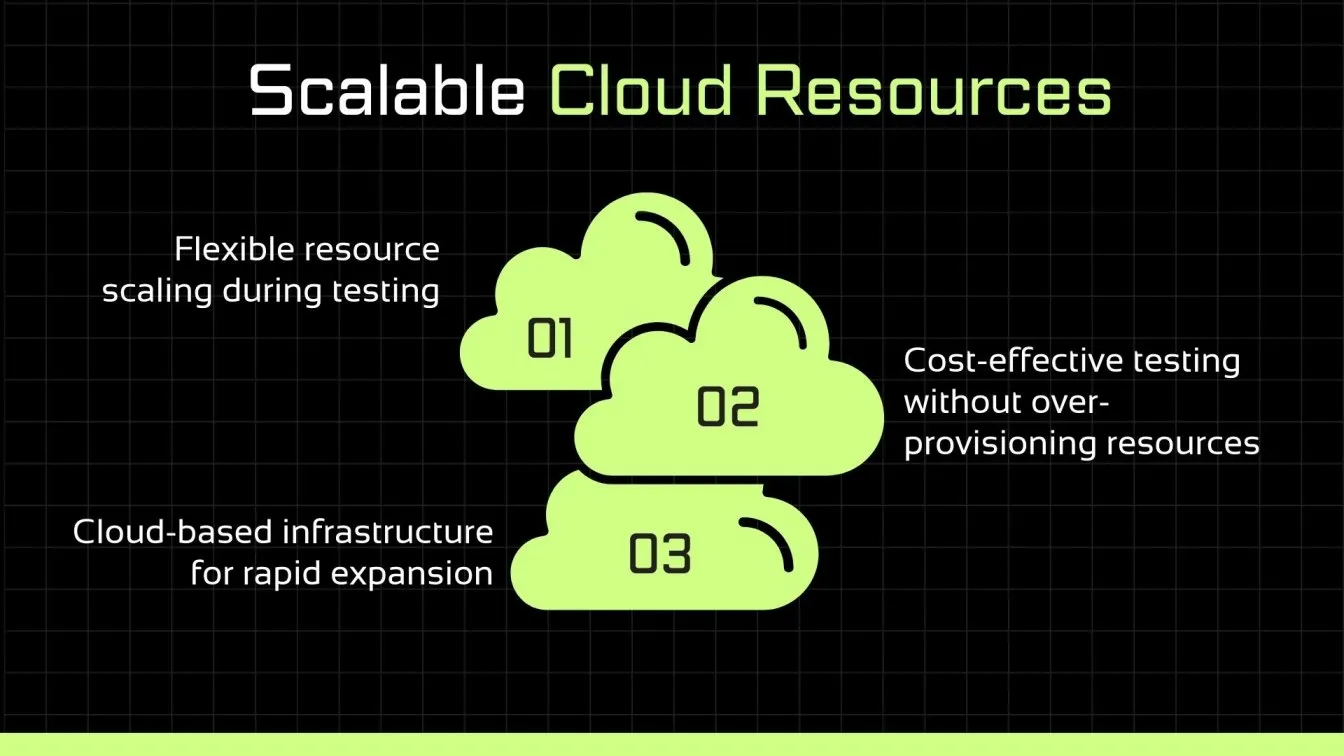
Cloud-based testing scales efficiently across a broad spectrum of use cases, from types of functional testing to various types of automation testing. Here's how cloud platforms support scalable QA:
- Diverse Testing Capabilities: Whether it's types of regression testing, types of integration testing, or types of API testing, cloud platforms can accommodate multiple test types with minimal setup. This allows businesses to perform comprehensive testing across various platforms and environments.
- Accelerated Testing Cycles: The ability to quickly scale testing environments leads to faster testing cycles, helping organizations meet deadlines without compromising on testing depth or quality.
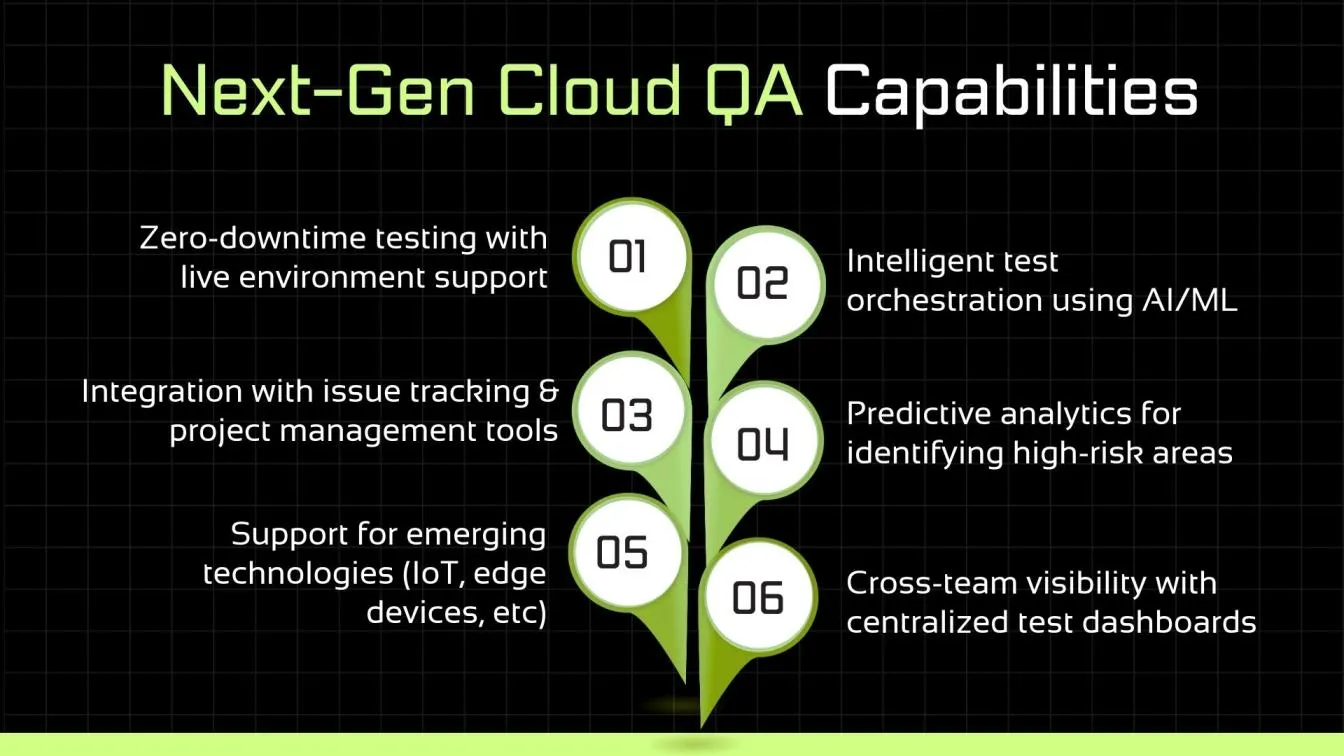
As testing demands evolve, cloud-based testing platforms ensure that testing teams can easily scale their resources to meet the growing complexity and volume of tests, making them a key tool for modern QA testing teams.
Popular Cloud Testing Platforms in the Market
With the rise of cloud computing, numerous cloud-based testing platforms have emerged to help software development teams manage and execute scalable testing efficiently. These platforms provide a variety of tools and services, leveraging cloud infrastructure to run tests across multiple environments and devices.
Here are some of the popular cloud testing platforms that leverage cloud-based infrastructure:
- AWS Device Farm: A comprehensive cloud testing service for testing mobile apps on real devices, offering integration with other AWS services.
- Google Cloud Test Lab: Part of Google Cloud, this platform provides a cloud-based testing environment designed to handle scalable testing needs for apps and websites.
- Microsoft Azure Test Plans: A complete testing suite for managing test plans, execution, and reporting, designed to work seamlessly within the Azure infrastructure.
- BrowserStack: Provides real-time, cross-browser testing on a cloud-based platform, allowing QA teams to test web applications on real devices and browsers.
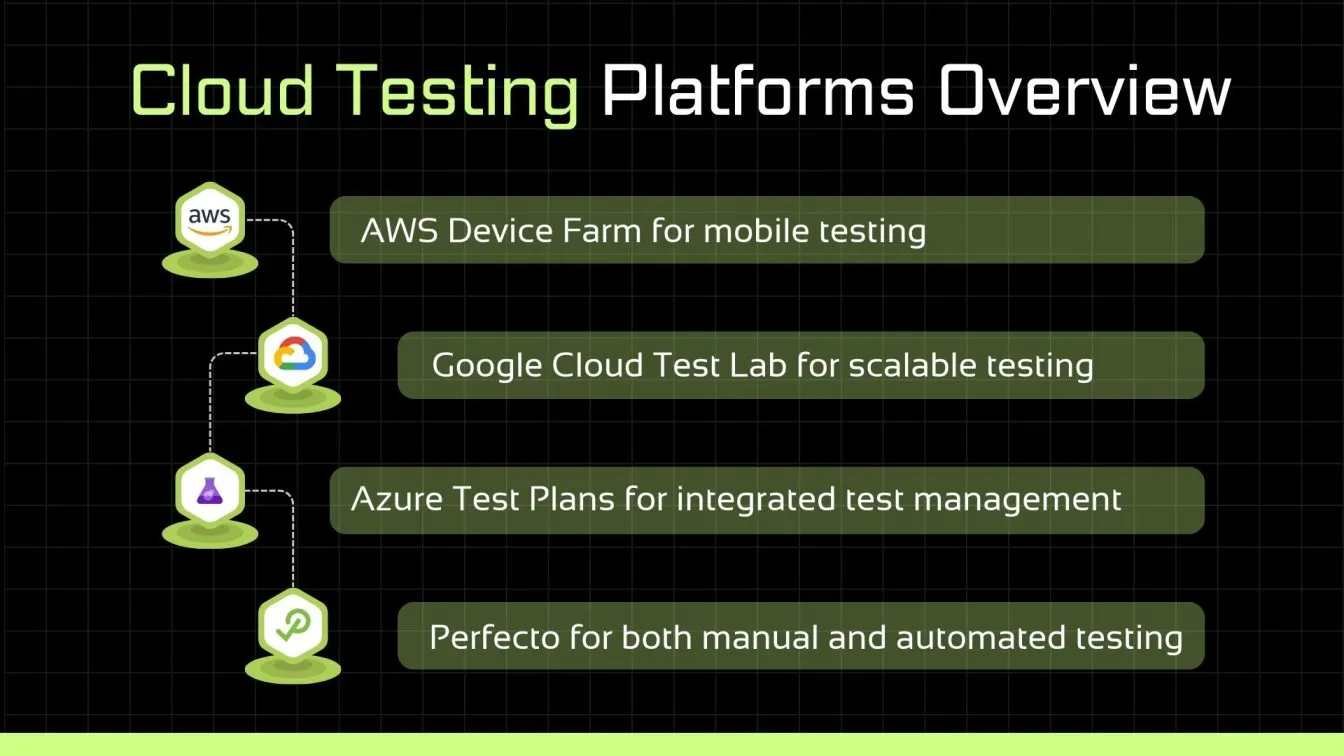
These platforms integrate robust cloud infrastructure, offering everything from cloud-based application security testing to cloud-based mobile app testing, allowing companies to optimize their testing strategies without extensive infrastructure setup.
Use Cases: When Cloud Testing Makes Sense
Cloud testing is a game-changer for teams practicing Agile and DevOps methodologies. These frameworks require frequent iterations, continuous integration, and rapid feedback loops, all of which are well-supported by cloud testing platforms.
Agile and DevOps Workflows
- Speed and Flexibility: Cloud testing enables faster testing cycles, aligning with Agile's need for quick feedback during each sprint.
- Continuous Testing: In DevOps, continuous integration and continuous testing go hand-in-hand. Cloud platforms can run automated tests every time code is committed, ensuring faster bug detection.
- Scalability: Cloud infrastructure allows teams to scale resources dynamically, testing applications under different environments without the need for physical hardware.
- Cross-Platform Testing: Cloud platforms support multiple devices, browsers, and operating systems, which is essential for testing applications across diverse platforms in Agile sprints or DevOps pipelines.
- Cost-Effective: With cloud-based testing, companies avoid costly infrastructure setups and only pay for the resources they use, which is particularly beneficial in fast-moving Agile and DevOps environments.
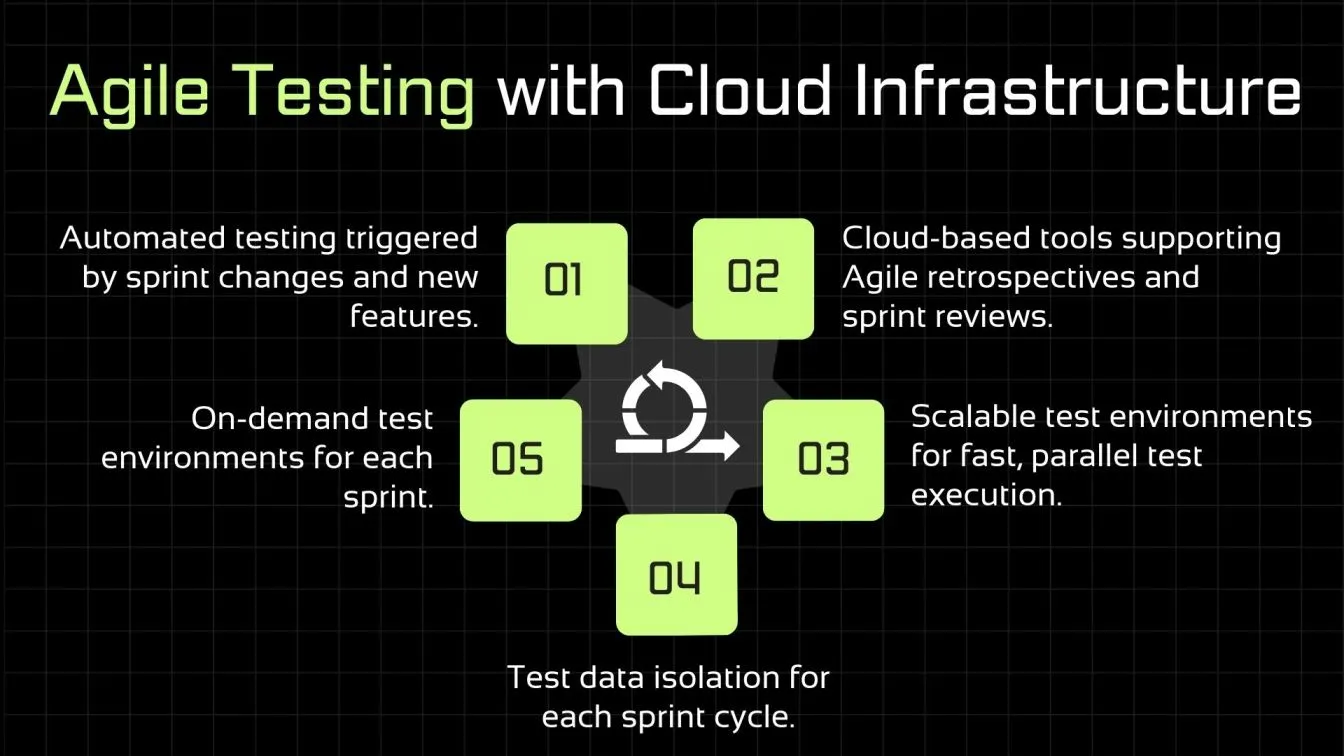
Cloud-based testing platforms enable Agile and DevOps teams to rapidly iterate and deploy, maintaining the efficiency and speed required to meet the demands of modern software development.
Challenges and Considerations in Cloud-Based Testing
While cloud-based testing platforms offer numerous advantages, they also come with certain challenges, particularly when it comes to data integrity, data security, and compliance. As businesses increasingly move their testing processes to the cloud, it’s crucial to address these concerns to ensure data protection and meet regulatory requirements.
Data Security and Compliance
Cloud-based testing platforms require strong data privacy protections with encryption to secure sensitive data. It's also important to assess third-party security risks and ensure providers meet your security standards. Additionally, disaster recovery plans must be in place to prevent data loss during outages or breaches.
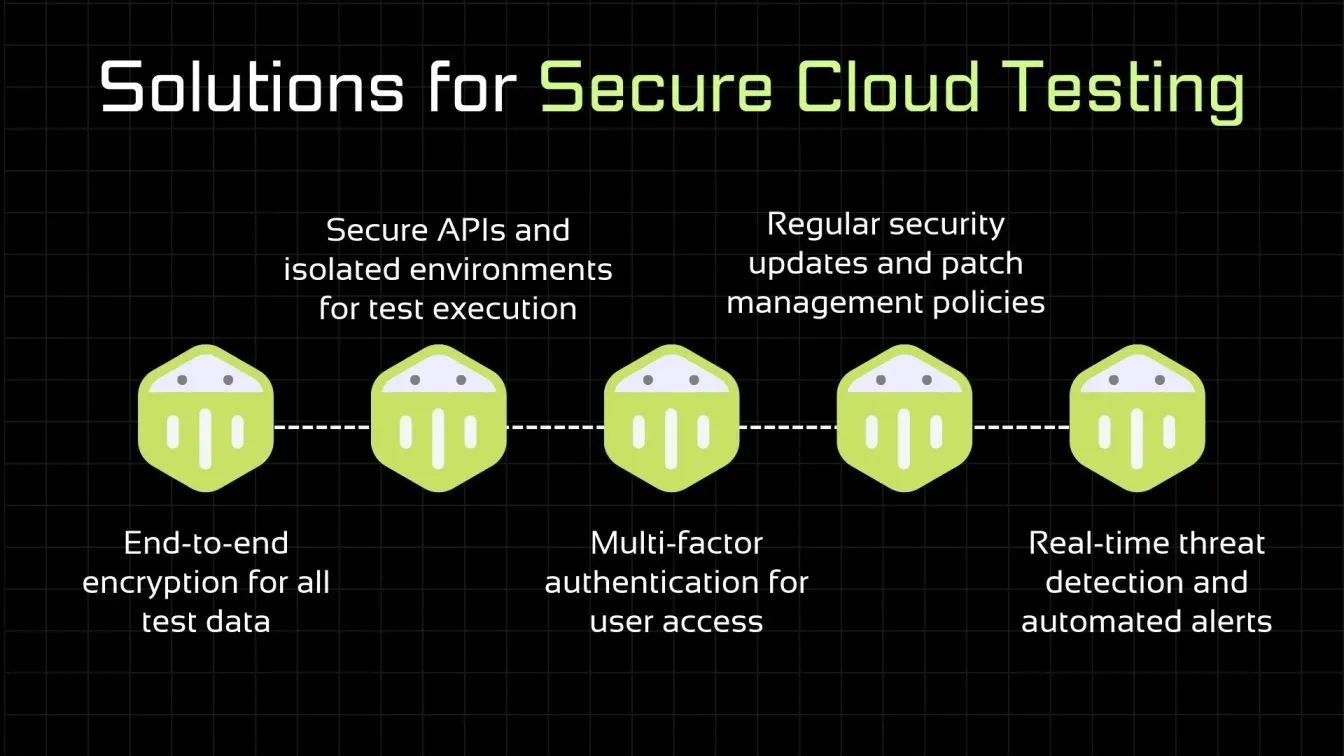
- Data Privacy: Storing sensitive testing data on cloud servers requires robust encryption and access controls to prevent unauthorized access. It's essential to ensure that cloud service providers implement industry-standard encryption protocols for data at rest and in transit.
- Third-Party Risks: When using cloud-based testing platforms, you are dependent on third-party providers for the security of your data. This means any lapses in their security policies could potentially expose your sensitive information, making it crucial to assess the provider’s security credentials and history.
- Data Loss Prevention: Cloud testing platforms must incorporate backup and disaster recovery strategies to ensure that testing data is not lost in case of an unexpected outage or breach. Testing teams need to evaluate the provider's contingency measures before fully committing to a platform.
- Regulatory Compliance: Depending on the nature of the data being processed, organizations must comply with regulations such as GDPR, HIPAA, and others. Cloud testing platforms need to adhere to these standards, which may include ensuring data residency (i.e., where the data is physically stored) and implementing audit trails for traceability.
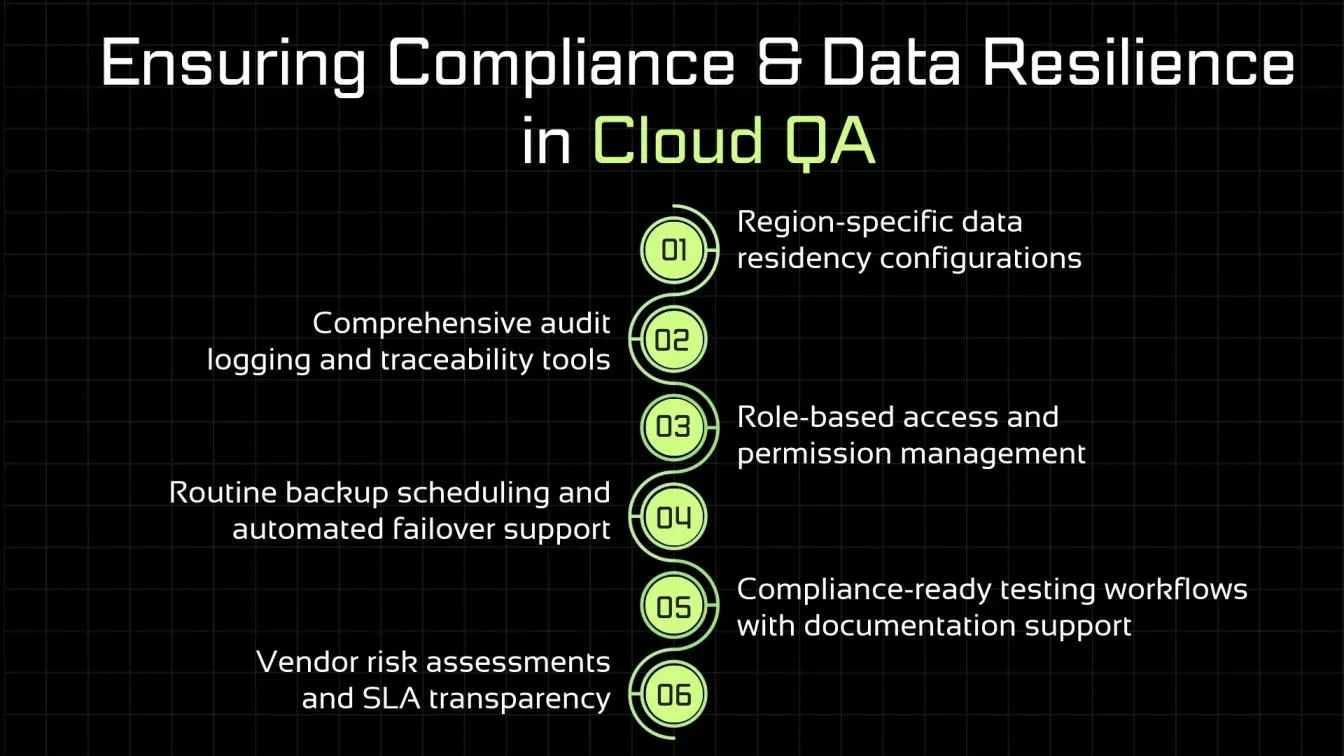
- Security Controls: Ensure that the platform offers customizable security controls to meet the specific needs of your organization. This includes role-based access, authentication protocols, and regular security audits.
Final Thoughts and Best Practices for Scalable QA
Cloud-based testing offers significant benefits for scalable QA, enabling flexibility, efficiency, and faster release cycles. By leveraging cloud testing tools, cloud-based testing services, cloud infrastructure testing, cloud migration performance testing, and cloud-based application testing, teams can streamline testing efforts and ensure robust application performance across different environments.
Key strategies include cloud migration testing for smooth transitions, cloud application security testing to identify vulnerabilities, and cloud automation testing to reduce manual work. Cloud performance testing and cloud penetration testing further enhance reliability by simulating real-world conditions.
Adopting these practices helps businesses scale their QA processes, improve software quality, and accelerate delivery.
Frugal Testing, a leading software testing company in Hyderabad, offers a wide range of services including functional testing, QA testing, and AI-driven test automation solutions. Known for its affordable yet high-quality approach, Frugal Testing is dedicated to delivering efficient software load assessments and seamless UPI integration APIs. With expertise in Selenium automation testing, the company has earned a strong reputation among top software testing companies globally. Visit frugaltesting.com to explore our tailored services for enterprises.
People also Asked
What is the difference between cloud testing and normal testing?
Cloud testing uses cloud infrastructure to simulate real-world environments and test scalability, while normal testing typically relies on physical hardware or on-premise environments.
How to test cloud storage?
Test cloud storage by evaluating data retrieval speeds, security measures, backup consistency, and scalability under different load conditions.
What is the difference between physical and virtual testing?
Physical testing uses real devices or hardware for testing, whereas virtual testing uses simulated environments or virtual machines to conduct tests.
What is qTest in SAP?
qTest is a test management tool integrated with SAP, designed to streamline test planning, execution, and reporting within agile environments.
What is the purpose of a cloud assessment?
A cloud assessment evaluates an organization’s readiness for cloud adoption, focusing on infrastructure, security, costs, and migration strategies.





%201.webp)

